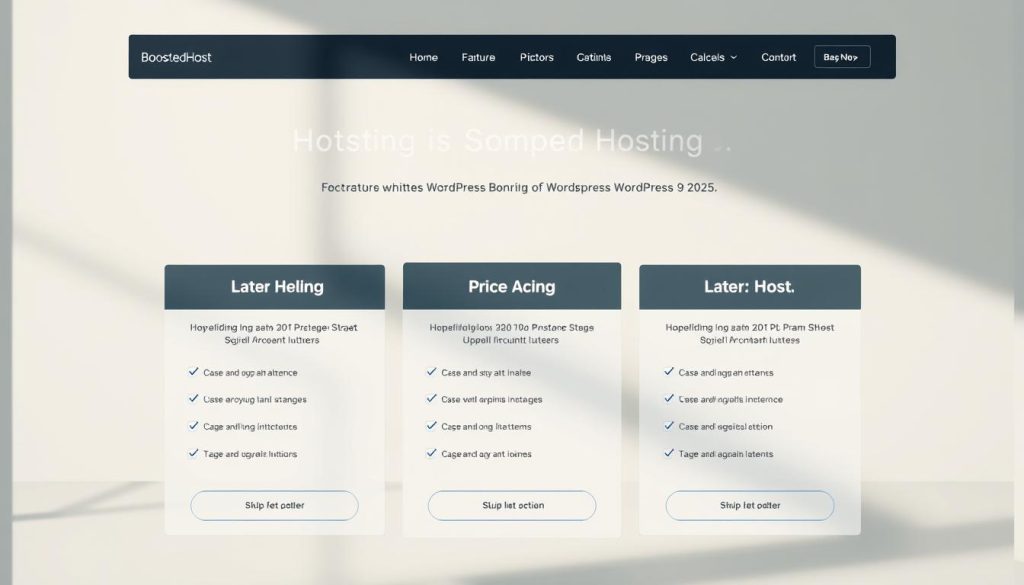Surprising fact: a one‑second delay can cut conversions by 7%, and many hosts quietly slow sites with hidden add‑ons.
You want hosting that puts speed first and skips the constant checkout nags. This roundup focuses on providers that deliver clear pricing and real‑world performance without surprise upsells.
We’ll compare uptime promises, caching tech, SSD and CDN access, and which features come free versus paid. You’ll also see monthly plans and honest renewal terms so your website budget stays predictable.
Whether you’re moving a small blog or scaling a busy store, this guide highlights value‑focused hosts and practical tradeoffs. Expect quick takes on support quality, migration help, and what each provider includes out of the box.
Key Takeaways
- Look for hosts that prioritize website performance and clear pricing.
- Check caching, SSD, and CDN availability before you commit.
- Monthly plans and transparent renewals protect your budget.
- Good support and free migrations reduce migration risk.
- This roundup filters alternatives that solve slow sites and confusing features.
Why you’re hunting for a host in 2025: performance, transparency, and real value
You need hosting that keeps your site snappy and your budget predictable. Many users move after facing slow pages, surprise renewal hikes, or support that vanishes when problems hit.
What you want to avoid
Avoid hidden fees and entry plans that lock basic features behind upgrades. Promo pricing that doubles at renewal and aggressive upsells drain your time and cash.
Skip sluggish speeds — slow load times and downtime kill conversions and frustrate visitors.
The core checklist
- Uptime: Look for published data and realistic guarantees.
- Speed: Caching, SSD storage, and CDN matter for real-world performance.
- Support: Fast, knowledgeable help via live chat or phone when you need it.
- Backups and ssl certificates: Daily backups and automatic SSL should be included, not upsold.
- Security: Proactive monitoring, a WAF, and malware scanning keep your web presence safe.
- Pricing: Clear renewal terms, monthly billing, and scalable resources save you time and money.
Your time matters. Pick a host that reduces maintenance overhead so you can focus on growing the website.
bluehost alternatives 2025: how we ranked the best options for you
We tested providers for honest pricing, built‑in performance features, and support that actually helps when things break.
Commercial criteria focused on transparent pricing, true renewal terms, and monthly billing so you don’t have to lock into long contracts. Plans that bundled essential features scored higher because fewer upsells mean better value for you.
Technical criteria
We checked server stacks for SSD storage, built‑in caching, and CDN access to lift real‑world performance.
Scalability was key: cloud or VPS growth paths kept sites from hitting resource ceilings during traffic spikes.
Support and security
Support depth mattered. We looked for fast live chat, phone help, and migration assistance to reduce downtime.
Security checks included WAF, malware scanning, and automated backups. Managed WordPress platforms with extra tools earned bonus points.
| Criteria | What we measured | Why it matters | Example providers |
|---|---|---|---|
| Pricing & plans | Transparent rates, monthly billing | Predictable costs, fewer surprises | DreamHost, IONOS |
| Performance | SSD, caching, CDN | Faster pages, lower bounce | SiteGround, Rapyd Cloud |
| Support & security | Live chat, migrations, WAF | Less downtime, safer sites | Liquid Web, IONOS |
SiteGround: faster WordPress hosting with SuperCacher and 99.9% uptime
SiteGround focuses on shaving milliseconds off load times with tools built for WordPress and WooCommerce.
Why pick it: SiteGround pairs an optimized server stack and SuperCacher to boost real-world performance. The platform uses SSD storage, built-in caching, and network tweaks that help your website load faster under typical traffic.
Why choose SiteGround over the usual upsell-heavy hosts: speed, support, and free migrations
Support matters: 24/7 multichannel help, including live chat, reduces downtime and troubleshooting time. Free migrations let you move your site without hassle.
“SiteGround gave our store solid uptime during a flash sale — zero panic, fast responses.”
Pricing snapshot and plans that fit small sites to WooCommerce stores
Plans start at $2.99 per month with straightforward pricing and essential features included. That makes SiteGround an easy pick if you want predictable pricing and less time chasing add-ons.
- Performance: SuperCacher, SSD, and CDN access.
- Uptime: 99.9% guarantee for steady availability.
- Customer support: Responsive live chat and 24/7 help.
- Value: Features included out of the box reduce extra costs.
Who it’s best for
If you run a small website, growing blog, or a WooCommerce store and care about speed and dependable uptime, SiteGround delivers solid value with simple plans and strong customer support.
Rapyd Cloud: premium speed and scaling for traffic spikes
When traffic spikes threaten your checkout, you need infrastructure built to absorb the load.
Rapyd Cloud is a cloud hosting option designed for high‑traffic stores and membership sites. Its high‑concurrency server design keeps pages fast when visitors flood in. You won’t need to overprovision resources just to survive peak hours.
Built for busy stores: high concurrency, WAF, and automatic threat scanning
Security is proactive here. A web application firewall and automatic threat scans reduce risk without complex setup. That data‑driven security helps protect checkout flows and login bursts.
Pricing and value: higher monthly cost, enterprise‑grade performance
Plans start at $29/month. This option is pricier than shared hosting, but the real‑world performance and resilience often pay off during big campaigns.
- Handles spikes: keeps your site stable under heavy concurrent logins.
- Managed security: WAF plus automatic scans reduce manual work.
- Developer tools: staging, backups, and WooCommerce plugin management on one dashboard.
Bottom line: If you’ve outgrown entry‑level hosting and expect marketing‑driven surges, Rapyd Cloud brings enterprise features that protect revenue and keep conversions steady.
DreamHost: transparent pricing, daily backups, and month‑to‑month flexibility
DreamHost simplifies hosting with plain‑spoken plans and built‑in protections.
What makes it different: DreamHost is independently owned and shows renewal pricing that’s lower and clearer than many rivals. You can choose monthly billing, so you’re not locked into long contracts.
Where it beats upsells
Daily backups come on every plan, so you don’t need extra add‑ons to protect your site. That saves money and time when you need a restore.
WordPress perks that get you started fast
For wordpress hosting, DreamHost includes one‑click installs, automatic updates, and a site builder. You also get a free domain for new signups on qualifying plans.
Support experience
Customer support is handled by in‑house experts via live chat and email around the clock. That means faster answers without being shuffled between tiers.
- Value: Plans start at $2.95/month and include useful features out of the box.
- Risk‑free trial: A 97‑day money‑back window gives you time to test uptime and usability.
A2 Hosting: developer‑friendly speed with Linux or Windows options
If you like hands‑on control and fast response times, A2 Hosting gives you both without fuss.
Pick the OS and toolchain that fit your workflow. You can choose Linux or Windows and use familiar developer tools for deployment. That flexibility keeps work moving and reduces environment surprises.
Performance and support: A2 builds for speed so your website feels snappy as you add features. Round‑the‑clock support helps when you need quick fixes or migration help.
- Scalable plans: start small and grow to eCommerce without forcing a platform switch.
- Pricing and refunds: plans begin at $1.95/month, with a 30‑day money‑back guarantee and prorated refunds up to 90 days.
- Security & email: basic protections and easy email setup keep daily ops simple.
“A2 makes it easy to migrate multiple sites and tune caching as traffic grows.”
| Feature | What you get | Best for |
|---|---|---|
| OS options | Linux or Windows hosting | Developers who need specific stacks |
| Support | 24/7 live help and migration tools | Teams moving sites with little downtime |
| Refunds & pricing | $1.95/month entry, 30‑day guarantee, prorated to 90 days | Cost‑conscious projects that may scale |
GoDaddy: simple setup for blogs and small business sites
For basic blogs and local business pages, GoDaddy streamlines setup so you can publish today. The website builder guides new users through templates and content blocks, making a clean website fast to launch.
Entry hosting and shared hosting plans start at about $5.99/month. That pricing is clear, and the occasional free domain offer helps lower upfront costs.
Support is easy to reach and the onboarding flow helps you connect a domain and publish pages quickly. If you value speed to market over deep customization, this is a good fit.
- Quick launch: the website builder gets you live with minimal setup.
- Basic features: email, SSL, and backups cover common needs.
- Scaling note: options for growth are modest compared with VPS or cloud providers.
“GoDaddy is a low‑friction way to publish a clean site when simplicity matters.”
Overall, GoDaddy offers solid beginner value for simple sites. If your goals change, you can move to a more flexible host later with little downtime.
Scala Hosting: affordable cloud VPS power without the complexity
If your shared plan feels squeezed, Scala Hosting hands you dedicated VPS performance at a fair price.
What you get: Scala delivers cloud VPS with dedicated server resources, so noisy neighbors won’t throttle your site. That isolation keeps performance steady as traffic climbs.
SPanel, one-click WooCommerce/PrestaShop/Magento, and free migrations
SPanel simplifies management and offers one-click installs for WooCommerce, PrestaShop, and Magento. You can launch an online store fast without wrestling with complex stacks.
Free migrations come with zero downtime, so moving a live website won’t cost you customers or search visibility. The team handles the technical lift while you stay focused on content and sales.
Who it fits: you’ve outgrown shared hosting but want value
Pricing starts at $2.51/month, making Scala a smart choice for users who need more power without enterprise costs. Plans scale as your website grows, so you can add resources without a full platform rebuild.
- Performance: dedicated resources from a cloud VPS for predictable speed.
- Features: easy control panel, one-click eCommerce installs, and managed options.
- Pricing & plans: accessible entry price with upgrade paths that keep costs predictable.
If you want higher reliability and more control than shared hosting offers, this provider balances power and simplicity well. For a quick comparison, compare Scala Hosting to similar options and see which choice fits your site.
HostArmada: cloud SSD speed with generous freebies
HostArmada bundles cloud SSD speed with helpful freebies so you can launch faster. The platform uses a cloud SSD stack that improves load times and steadies performance during traffic swings.

Free domain, SSL, daily backups, and an easy website builder
What you get: HostArmada includes daily backups, a free domain registration or transfer, and free ssl certificates for every site.
One-click WordPress installs and a drag-and-drop website builder make setup quick whether you prefer a CMS or a visual editor.
Support handles free migrations, so moving your website is low-stress. Pricing starts at $2.49/month and plans come with a 45-day money-back guarantee.
| Feature | Included | Best for |
|---|---|---|
| Cloud SSD | Yes — all plans | Faster load times and steady performance |
| Daily backups | Automatic daily copies | Easy restores after issues |
| Free extras | Domain, SSL, migrations, builder | New sites and budget-conscious owners |
| Trial & pricing | $2.49/mo, 45-day guarantee | Try risk-free with clear pricing |
Bottom line: If you want strong baseline performance and lots of included features without upsells, HostArmada offers clear value and approachable support for new and growing sites.
GreenGeeks: performance plus eco‑friendly hosting benefits
GreenGeeks pairs strong server tuning with an environmental pledge that actually matters for your site. The platform blends LiteSpeed, SSD storage, and MariaDB optimizations so your pages load faster under typical traffic.
Speed, reliability, and 300% renewable energy match
Green credentials don’t slow you down. GreenGeeks claims 99.99% uptime and uses PowerCacher plus a CDN to keep real-world performance steady during bursts.
They offset energy use by 300% with renewable credits, so your footprint shrinks while your site stays responsive.
What’s included that often costs extra elsewhere
Free SSL certificates, a free domain or transfer, daily backups, and one-click migrations come standard. Those features give you better value without surprise add‑ons.
- Performance tech: LiteSpeed, SSD, PowerCacher, and CDN.
- Security & backups: account isolation, daily scanning, and automatic backups.
- Support & e-commerce: 24/7 chat, phone, and easy store tools for checkout speed.
| What you get | Why it helps | Good for |
|---|---|---|
| LiteSpeed + CDN | Faster page loads | Traffic‑heavy sites |
| Daily backups | Quick restores after issues | Small businesses |
| 300% renewable match | Lower environmental impact | Eco‑conscious owners |
Bottom line: If you want a hosting option that balances speed, uptime, and clear pricing with sustainable credentials, GreenGeeks is a strong pick for your website.
IONOS: fast hosting, strong uptime, and a personal consultant
If uptime and a single point of contact matter, IONOS serves predictable performance with human support.
Quick snapshot: IONOS stores your data across two data centers and promises 99.99% uptime. That redundancy keeps your website online during maintenance or outages.
Dual‑data‑center reliability, DDoS protection, and malware scans
The platform includes DDoS protection, malware scanning, and both automated and manual backups with easy restores. These features create a solid security baseline for business sites.
Scalable performance levels and competitively priced plans
Performance scales by levels (level 1 supports ~100 visitors/min with 512 MB, level 5 handles 500+). Entry pricing starts around $4/month for the first year ($6 after), and many plans include a free domain for a year.
Who should choose IONOS: SMBs wanting speed and support
This provider is a smart choice if you want steady speed, clear pricing, and a personal consultant. Each customer gets 24/7 live chat and direct help, so your team spends less time on hosting and more time on the site.
| Feature | Why it helps | Good for |
|---|---|---|
| Dual data centers | Higher availability | Small businesses |
| Backups & security | Quick recovery and threat defense | Ecommerce and membership sites |
| Performance levels | Scale without replatforming | Growing websites |
Liquid Web: fully managed WordPress and VPS for mission‑critical sites
When uptime is non‑negotiable, you pick a host built for mission‑critical work. Liquid Web focuses on managed operations so your team spends less time on server drama and more time on growth.

What you get: managed wordpress plans that include iThemes Security Pro and Sync. Those tools let you secure and manage multiple sites from one dashboard.
Why it matters: Liquid Web owns its data centers, which improves transparency over security and network performance. That control supports their 99.999% site uptime target and 100% network uptime commitment.
- Performance: high‑end hardware and generous managed VPS resources outperform many unmanaged options.
- Security & features: built‑in hardening, backups, and centralized site management reduce admin overhead.
- Pricing & value: plans cost more, but included tooling and white‑glove support lower your total operational burden.
| Focus | Why it helps you | Best for |
|---|---|---|
| Managed WordPress | Centralized updates, iThemes Security Pro, Sync | Agencies and multi‑site teams |
| Performance & uptime | Premium servers, 99.999% site uptime target | Revenue‑critical sites |
| Owned data centers | Direct control over network and security | Businesses needing predictable reliability |
“If you’ve outgrown commodity hosting, Liquid Web removes DIY complexity so your website runs without constant babysitting.”
InterServer: veteran value for flexible hosting needs
InterServer packs decades of steady service into straightforward hosting that doesn’t overcomplicate things.
Why it stands out: operating since 1999, this provider leans on a long track record to offer practical value. If you prefer proven names over hype, InterServer gives steady performance and clear billing.
Shared hosting plans include the core features most users need to get online. Pricing stays stable and avoids heavy promo swings that confuse budgets.
Options span shared, VPS, and dedicated servers so you can grow without switching brands. Support handles everyday tasks well, and email setup is painless for small teams.
- Practical features: useful defaults, simple control panel.
- Clear pricing: no surprise renewals or aggressive upsells.
- Upgrade paths: scale resources without migrating away.
| What | Included | Best for |
|---|---|---|
| Shared hosting | Core tools, easy email | Blogs and small business sites |
| VPS options | Flexible resources, predictable pricing | Growing sites that need power |
| Support | 24/7 help for common tasks | Users who want simple, reliable service |
Conclusion
Find a provider that replaces surprise upsells with real features and predictable performance. The bluehost alternatives 2025 here focus on clear pricing, fast performance, and support that answers when you need it. That saves you time and keeps conversions steady.
Compare how each hosting option handles caching, backups, and security. Look at plans, pricing, and migration help so your website moves smoothly with minimal downtime.
Pick SiteGround for hands‑on speed, Rapyd Cloud for big traffic, or DreamHost for month‑to‑month flexibility. Whatever you choose, match providers to your performance, security, and support priorities. This keeps your site reliable and your experience focused on growth, not hosting headaches.
FAQ
How do I pick the right web host for WordPress and eCommerce sites?
Look for solid uptime, fast server response, daily backups, and a managed WordPress option if you want hands‑off updates. Compare CDN availability, SSL certificates, and caching tech. Also check support channels — live chat and phone help cut troubleshooting time. Prioritize providers with clear pricing and fair renewal rates so you don’t get surprised later.
Do I need managed WordPress hosting or is shared hosting fine?
If you run a blog or a small brochure site, shared hosting often gives good value. Choose managed WordPress if you want automatic updates, specialized caching, daily backups, and expert support tailored to WordPress performance and security. Managed plans cost more but save time and reduce downtime risk during traffic spikes.
How important are daily backups and site migrations?
Extremely important. Daily backups protect you from data loss and let you restore quickly after errors or hacks. Free or affordable migrations save time and cut the technical friction when you switch hosts. Look for providers that include these services in their plans rather than charging extra.
Will a website builder affect my site’s performance or SEO?
A lightweight, well‑coded website builder won’t hurt speed or SEO. Avoid builders that add excessive JavaScript or slow templates. Check that the host offers SSL, good caching, and the ability to tweak meta tags and permalinks for SEO. If performance is critical, choose a host with SSD storage and optional CDN integration.
How do SSL certificates and security features vary between hosts?
Many hosts include free SSL certificates from Let’s Encrypt. Higher‑tier plans may add WAF (web application firewall), malware scans, and DDoS protection. For eCommerce, ensure PCI compliance and regular security scans. Confirm whether security features are included or sold as add‑ons.
What should I expect from customer support when something breaks?
Expect fast, knowledgeable agents reachable via live chat and email, with phone support for urgent issues. Look for 24/7 support and migration assistance. Check independent reviews for response times and ticket resolution quality before committing to a host.
How much does performance differ between shared, VPS, and cloud hosting?
Shared hosting shares resources across sites, so performance can vary with noisy neighbors. VPS gives dedicated resources and predictable speed. Cloud and managed VPS scale better for traffic spikes and deliver higher uptime. Choose based on traffic, budget, and the need for scalability.
Are free domains included with hosting plans, and are there caveats?
Some hosts include a free domain for the first year. Renewal fees apply after that, so check the multi‑year cost and domain management rules. Also confirm whether privacy protection is included or sold separately.
How do caching, CDN, and server stack affect page speed?
Caching reduces server work by serving static content, CDNs place files closer to visitors, and a modern server stack (NGINX, PHP‑FPM, SSD storage) speeds up processing. Together they cut load times and improve user experience. Look for hosts that combine these features or let you enable them easily.
Can I change plans or scale resources without downtime?
Many hosts offer seamless scaling between shared, VPS, and cloud tiers. Managed and cloud hosts typically handle scaling with minimal downtime. Confirm the provider’s upgrade path, billing proration, and whether they offer hands‑on migration support during scaling.
What are common hidden fees to watch for in hosting plans?
Watch for high renewal rates, charges for backups or migrations, domain privacy fees, and limits on email accounts. Also check resource caps like monthly visitor limits or CPU throttling, which can trigger upgrade prompts. Choose hosts with transparent pricing and clear resource allocations.
Is uptime really guaranteed, and how should I read SLA claims?
Uptime promises vary. Look for real historical uptime data and an SLA that specifies credits for downtime. A 99.9% uptime claim still allows measurable monthly downtime, so read the fine print. Providers with redundant data centers and clear incident reporting are preferable.
Which hosts offer the best value for small businesses on a budget?
Seek plans that bundle essentials: free SSL, daily backups, an included domain year, and reliable support. Some providers focus on affordable cloud or shared plans with higher performance and useful extras. Compare pricing features and renewal costs rather than headline promotions.
How does email hosting factor into choosing a provider?
If you need professional email, check whether the host includes mailboxes or charges extra. Some hosts integrate with Google Workspace or Microsoft 365. Ensure spam filtering, mailbox size, and IMAP/SMTP access meet your needs before buying a plan.
What uptime and speed metrics should I look for in reviews?
Look for consistent 99.9%+ uptime and sub‑second Time To First Byte (TTFB). Page load tests, real‑world load testing, and geographic performance comparisons help you understand actual visitor experience. Reviews that include sustained traffic tests are especially useful.
Are green hosting options worth considering for performance and sustainability?
Yes. Eco‑friendly hosts often offset energy use with renewable credits or purchase power agreements while still offering strong performance. If sustainability matters to you, pick a provider with transparent green practices and good technical specs like SSD and CDN support.




